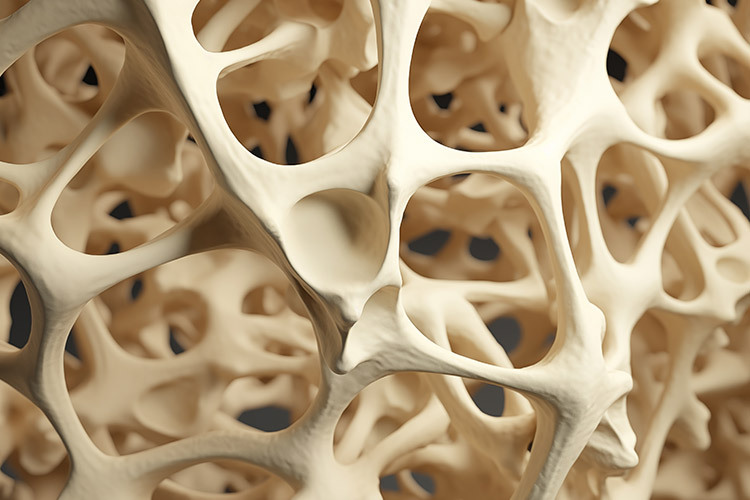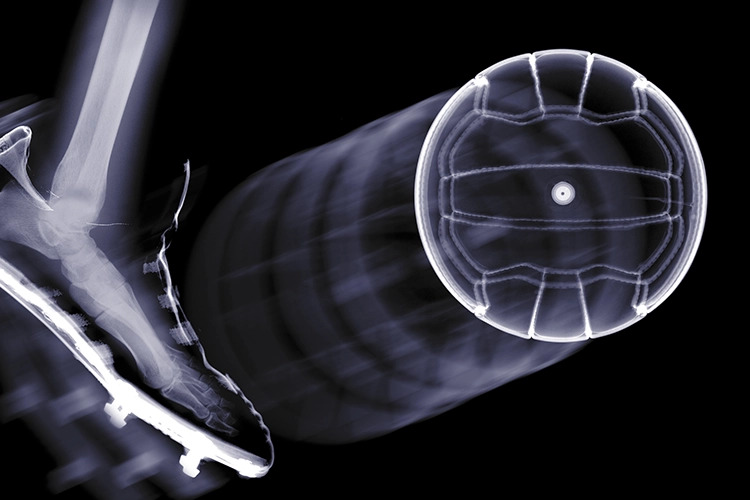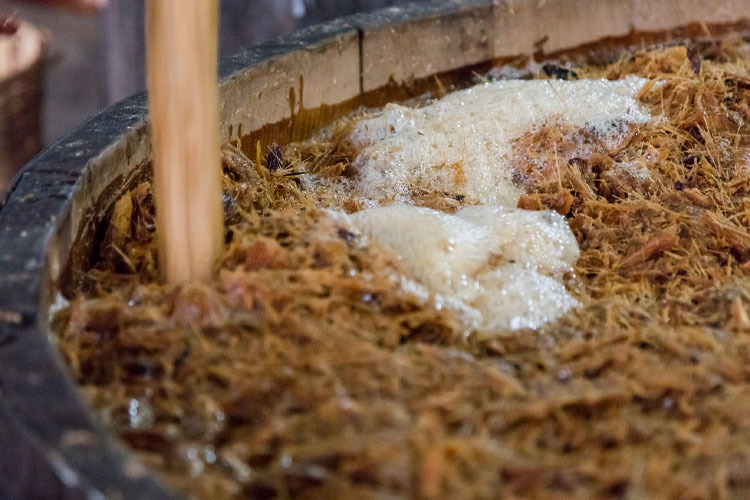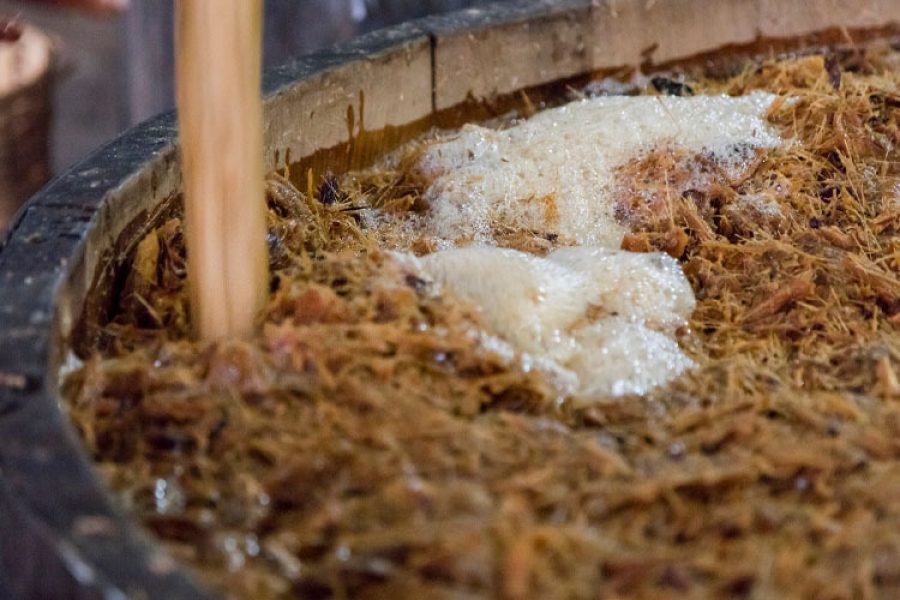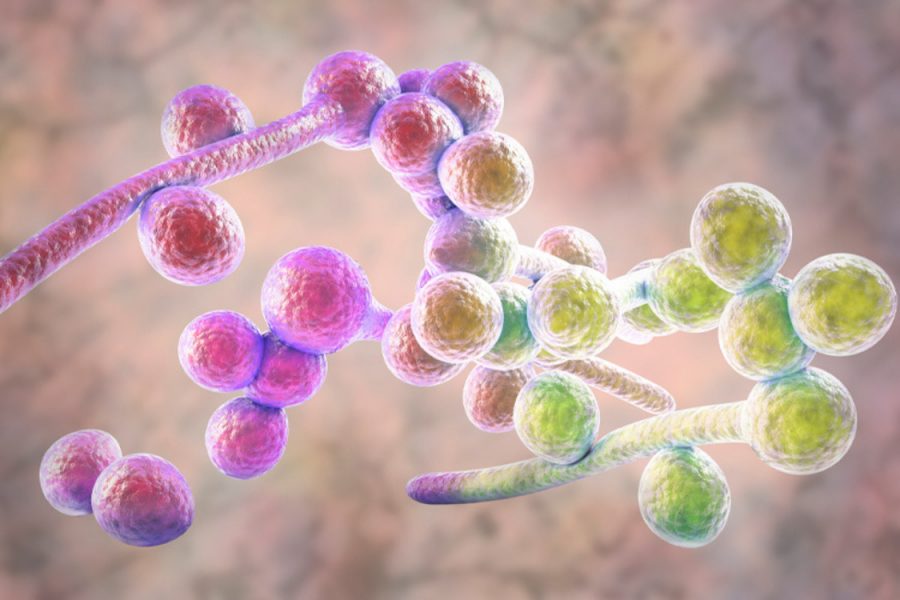By Fernanda Mesa Chávez and Cynthia Villarreal Garza
Breast cancer is the most common type of cancer among women. While it is typically diagnosed at older ages, up to 14% of breast cancer patients in Mexico are 40 years old or younger at the time of diagnosis. (1)
Young women with breast cancer may experience specific treatment side effects related to their age and the changes in estrogen levels caused by chemotherapy or anti-hormonal therapy.
Among these, potential bone density loss is a significant consequence, as it can lead to osteopenia and osteoporosis, which may cause complications such as pain and fractures. (2,4)
Since these conditions can significantly impact the quality of life of young women, a multicenter study evaluated how frequently these patients experience low bone density and the factors associated with this decrease. (5).
Cancer and Bone Density
The study was conducted at five referral centers in Mexico: TecSalud in Nuevo León; the Breast Cancer Foundation, National Institute of Cancerology, and National Institute of Medical Sciences and Nutrition Salvador Zubirán in Mexico City; and the ISSSTE Regional Hospital in León, Guanajuato.
The study included young women diagnosed with breast cancer at age 40 or younger who were treated with chemotherapy and/or anti-hormonal therapy between 2010 and 2020.
The patients’ Medical records were reviewed to collect results from bone density studies (DEXA), a tool used to measure bone density. (6,7)
Demographic, clinical, and treatment data were also gathered to explore factors associated with the patient’s conditions. At the time of breast cancer diagnosis, the average age of the patients was 36 years (range: 21-40), and 98% were premenopausal.
Their treatment included chemotherapy in 93% of cases, anti-hormonal therapy in 65%, anti-HER2 therapy in 21%, and radiotherapy in 75%. The anti-hormonal therapy consisted of tamoxifen in 61%, aromatase inhibitors in 17%, and dual hormonal blockade with GnRH agonists or bilateral oophorectomy in 21%.
Of the 1,259 patients included, only 20% had documented bone density results. Among them, 64% experienced low bone density after starting cancer treatment.
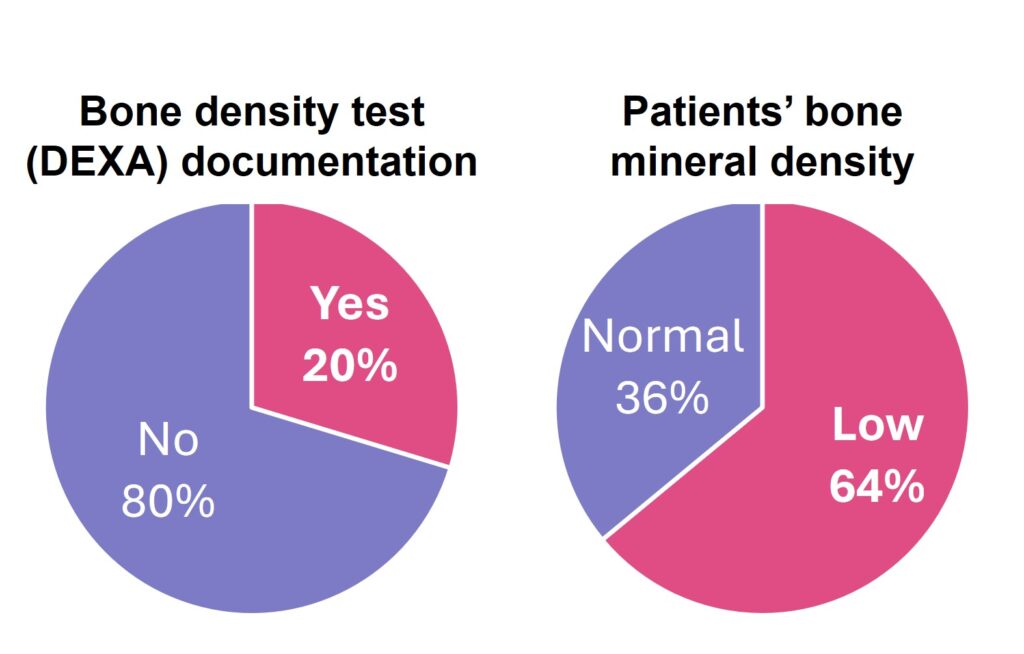
The periods with the highest proportion of patients experiencing low bone density were observed between 37-60 months and beyond 60 months after the start of chemotherapy and/or anti-hormonal therapy.
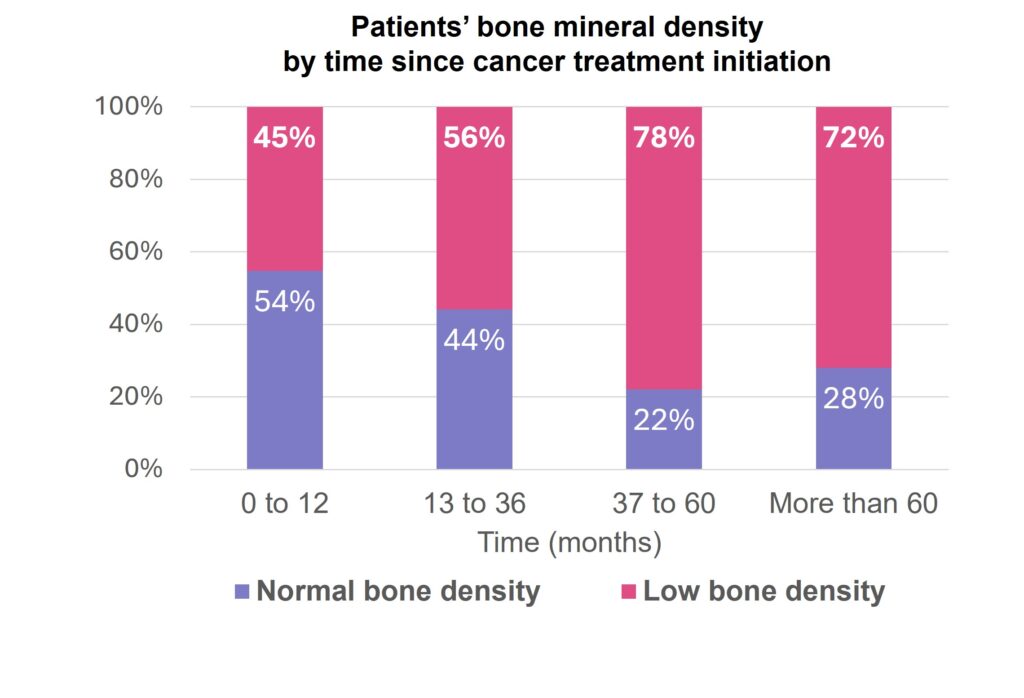
The analyses revealed that low bone density was associated with anti-hormonal treatment using aromatase inhibitors (nearly twice the likelihood of experiencing low bone density) and with dual hormonal blockade using GnRH agonists or bilateral oophorectomy (twice the likelihood of experiencing low bone density).
Interpreting the Studies
This study revealed inadequate monitoring of bone density, suggesting insufficient attention to this critical issue.
Furthermore, the prevalence of low bone density in a significant proportion of patients suggested that young women with breast cancer experience accelerated and considerable bone loss.
The results of this study underscore the need for regular monitoring through bone density scans, as international clinical practice guidelines recommended. (8,9)
Attention must be given to monitoring patients treated with aromatase inhibitors or dual hormonal blockade.
Implementing more rigorous monitoring practices will enable timely interventions to mitigate negative effects and improve quality of life, and long-term survival.
Additionally, it is essential to promote health policies that ensure access to diagnostic and treatment tools providing timely and comprehensive care.
References
1. Villarreal-Garza, C. et al. Breast cancer in young women in Latin America: an unmet, growing burden. Oncologist 18(12), 1298-1306 (2013).
2. Shapiro, C. L., Manola, J. & Leboff, M. Ovarian failure after adjuvant chemotherapy is associated with rapid bone loss in women with early-stage breast cancer. Journal of Clinical Oncology 19(14), 3306-3311 (2001).
3. Gnant, M. et al. Zoledronic acid prevents cancer treatment-induced bone loss in premenopausal women receiving adjuvant endocrine therapy for hormone-responsive breast cancer: a report from the Austrian Breast and Colorectal Cancer Study Group. Journal of Clinical Oncology 25(7), 820–828 (2007).
4. Hadji, P. et al. Cancer treatment-induced bone loss in premenopausal women: A need for therapeutic intervention? Cancer Treatment Reviews 38(6), 798-806 (2012).
5. Mesa-Chavez, F. et al. Multicenter Study on the Frequency of Low Bone Mineral Density in Young Women With Breast Cancer and Associated Factors. Clinical Breast Cancer S1526-8209(24)00112-5 (2024).
6. Kanis, J. A. Assessment of osteoporosis at the primary health care level. World Health 12(4), 1-337 (2007).
7. International Society for Clinical Densitometry. 2019 ISCD Official Positions: Adult.
8. Runowicz, C. D. et al. American Cancer Society/American society of clinical oncology breast cancer survivorship care guideline. Journal of Clinical Oncology 24(6), 611-635 (2016).
9. Paluch-Shimon, S. et al. ESO–ESMO fifth international consensus guidelines for breast cancer in young women (BCY5). Annals of Oncology 33(1), 1097-1118 (2022).
Authors
Fernanda Mesa Chávez. She holds a degree in Medicine and a Master’s in Biomedical Sciences from Tecnológico de Monterrey. She currently serves as the Coordinator of the Oncology Research Group at TecSalud’s Breast Cancer Center. She has published 18 articles in internationally indexed journals and 30 abstracts at international conferences. Her scientific interests focus on breast cancer research and the design and implementation of research projects with direct clinical applications to improve patient care and well-being.
Cynthia Villarreal Garza: Director of the Oncology Institute at TecSalud. She founded and directs “Joven & Fuerte: Program for the Care and Research of Young Women with Breast Cancer.” Co-founder of the civil association “Doctors and Researchers in the Fight Against Breast Cancer.” Since 2007, she has been a professor at Tecnológico de Monterrey. Cynthia has published over 150 indexed articles and is a Level II member of Mexico’s National System of Researchers. Her projects are primarily dedicated to improving the lives of breast cancer patients in Mexico.
